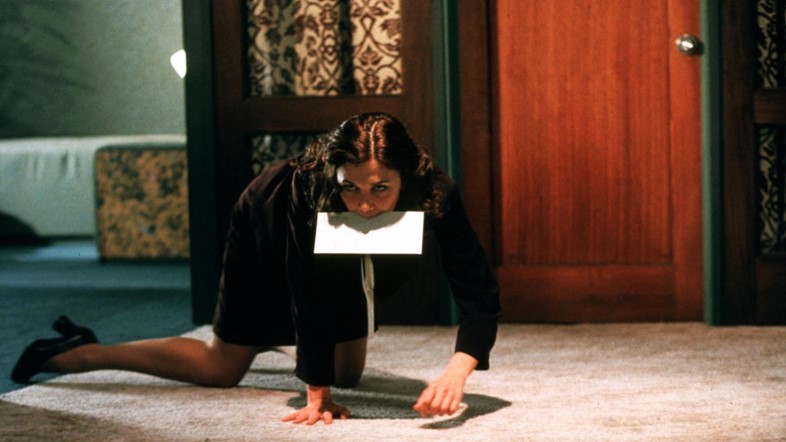In Halina Reijn’s seamy erotic thriller, the corporate workplace has again become a site of transgressive fantasy. What is behind this comeback?
In the final 20 minutes of Halina Reijn’s latest feature Babygirl, a personal assistant chastises her boss for bad behaviour. “I genuinely believed that women with power would behave differently,” Esme (former AnOther Magazine cover star Sophie Wilde) finger-wags at Romy (Nicole Kidman), a high-flying, self-made tech CEO who has put her job and family on the line by embarking on an affair with none other than Esme’s boyfriend – the office intern – Samuel (Harris Dickinson).
And yet, Esme confesses that it’s in her interest to keep Romy on her professional pedestal, given how few women climb their way to the top – Esme simply wishes that her employer be a better role model. In Reijn’s steamy erotic thriller, the corporate, green-washed gloss of Romy’s commercial sphere stands in sharp contrast to the sexual kink she keeps to herself. The sanitised sheen of the American commercial environment – and Romy’s unrivalled seniority within it – would seem to amount to the perfect set-up for a high-stakes sexual thriller centring on a 20-something trainee dominating a much older, more powerful woman. As it turns out, because of her repressed desires, Romy hasn’t orgasmed over the course of her 19-year marriage.
Babygirl is not the only recent erotic thriller whose lopsided power dynamics can be traced back directly to the workplace. Industry, the thriller-adjacent series devised by former bankers Mickey Down and Konrad Kay, sees its suits play fast and loose not only with their careers and their client’s money, but also their hook-ups. In Fair Play, the secret engagement of two hedge fund analyst colleagues unravels when one is promoted, amid psychological and sexual warfare. A gender-swapped remake of Dead Ringers, starring Rachel Weisz as twin gynaecologists, harks back to the slick tailoring of the original, as well as the office getup of other cult 80s and 90s thrillers such as Basic Instinct and Disclosure.

Meanwhile, the humdrum nine-to-five is capturing the wider cultural imagination. In FKA Twigs’ Eusexua, the singer is seen briefly freeing herself and her coworkers from their corporate shackles. Fashion this year has been ruled by the ‘office siren’ trend, while TikTokers have lusted over ‘men in finance’. Incestuous office politics and claustrophobically close quarters once made these city blocks a prime spot for high-octane dramas like American Psycho and Secretary. But after decades of the dismal, dreary corporate vision served up by The Office, the workplace has again become a site of transgressive fantasy.
So, aside from a possible nostalgia for offices post-Covid, what is behind this comeback? Taking cues from the work of fellow Dutch director and erotic thriller maven Paul Verhoeven (and making her debut with a more strait-laced Verhoeven tribute, Instinct, in 2019), in Babygirl Reijn seeks to remould the erotic thriller according to a contemporary feminist viewpoint. “I felt very seen by [erotic thriller] movies because as a woman with my desires, I always felt like an alien,” she explained in an interview. The difference here is that, where the erotic thriller usually punishes women for their wayward desires, Reijn ensures her characters remain unscathed, adding: “I want to create female characters that try to liberate themselves but stay alive.”

With recent remakes of Presumed Innocent and Fatal Attraction roughly 30 years on, the erotic thriller genre seems to be coming full circle, albeit with a post-#MeToo bent. In a 2023 think piece, critic Steph Green noted that the younger generation who worked in film and TV at the time – including Reijn – are now in the director’s chair, while “the erotic thriller has renewed appeal because it can give voice to women’s rage”.
One of the main places where gender-related power is at its most acute is the office. The barely dwindling gender pay gap, together with the current economic recession, lends more than a hint of aspiration to the swathes of crisp tailoring and blazers hitting the runways. As Babygirl insists on reminding us, female CEOs are a rarity. Further drawing attention to the gender misbalance, the film pits Romy’s baby pink blouse and pencil skirt combo against Harris Dickinson’s more neutral blue suit. Romy’s power is as much a part of the fantasy, but importantly, as the dubious hyper-sexualisation of the ‘corporate fetish’ trend indicates, that power is still contested. Samuel’s brazen pursuit of Romy, despite her protestations, sums up this off-kilter dynamic.

For most of us, the risky, gruelling but often glamorous lifestyles of city workers in Industry and Fair Play offer a dose of escapism. There is also a crucial element of satire in these dramas, allowing us to laugh or ogle in shock at the reckless, selfish types such offices attract, their horniness merely an extension of their capitalistic drive. Babygirl is no such barbed takedown of women at the helm, or the doubtfully ethical company Romy runs. But for its weaknesses, its message of self-acceptance does raise interesting questions about female sexuality and how that fits into the workplace. By keeping her characters intact and therefore needing to lower the stakes, Reijn has created a newfangled kind of anti-erotic drama – one which goes beyond a version of feminism in which working women must always set “a good example”.
Babygirl is out in UK cinemas on January 10.
